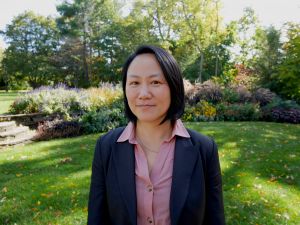Yu-Fang Cho

Education
- Ph.D., Literature in English, University of California at San Diego
- M.A., English, University of Wisconsin at Madison
- B.A. with distinction, Foreign Languages and Literature, National Taiwan University, Taipei, Taiwan
Biography
I am a multilingual transdisciplinary scholar with active intellectual ties with historically underrepresented communities in the US, Asia, and across the Pacific. My research and teaching centers transnational and decolonial feminist approaches to comparative racialization and intersecting U.S. imperial formations in relation to Asia and the Pacific, always striving to both elevate and activate the rich yet often obscured histories, experiences, and critical perspectives of marginalized peoples as critical archives for new knowledge pathways for transformative world-building practices. For close to two decades, my scholarship has broadly focused on diverse forms and modalities of social inequities that have emerged from the long history of the United States’ entangled relationship with Asia and the Pacific. These wide-ranging research projects have been animated by my deep commitment to transdisciplinary methodological innovation: to develop decolonial, relational, and comparative transnational feminist approaches that speak across different fields and reframe established paradigms in order to more effectively illuminate the complex origins of and possible solutions to urgent contemporary issues, from the contentious gay marriage debate in the US to environmental challenges in Asia and the Pacific.
My book, Uncoupling American Empire: Cultural Politics of Deviance and Unequal Difference, 1890-1910 (SUNY, 2013), is an interdisciplinary feminist cultural history that illuminates the historical and systemic origins of the gay marriage debate in late-twentieth-century United States by tracing the dynamic relationships between marriage and subjects marked by slavery, prostitution, indentured labor, and colonialism across different racialized and gendered contexts. My current book project, The Afterlives of the Nuclear Pacific: Re-membering Indigenous-Asian Relationality in Transpacific Modernity, furthers my commitment to critical analyses of race, reproductive and sexual politics, and inequalities in America’s Asia Pacific. This project analyzes the ways in which narratives of technological development around nuclear issues both undergird and obscure the uneven conditions of life, death, and militarization along lines of race, class, gender, and sexuality in the post-WWII era. I have co-edited the 2017 special issue of American Quarterly, which examines the implications of the rise of China for social relations in the United States as they are mediated by historical, literary, and cultural narratives. I have also published close to 20 peer reviewed journal articles and book chapters in leading interdisciplinary journals and contribute to a number of emerging dialogues on transpacific studies, from transnational literary imagination about gender and sexuality in the contexts of global Asian diasporas and Afro-Asian relationality in the Caribbean to race, gender, reproduction, and ecological imaginaries in twentieth- and twenty-first-century literature and film.
My transdisciplinary academic scholarship has been recognized by prestigious US and international research fellowships granted by institutions such as Cornell University’s Society for the Humanities, the Research Institute for the Humanities and Social Sciences in Taiwan, the Huntington Library, and the Institute of Global Conflict and Cooperation at the University of California, among others. Since October 2022, I have been an active member of the Oregon Water Futures Collaborative, where I am building relationships for community engaged research and public scholarship. I am excited to join a lively community of scholar-teachers at UO in Winter 2024 to develop new projects on public scholarship and community engaged research that align with the mission of the Environment Initiative, the Center for Environmental Futures, and the Pacific Northwest Just Futures Institute for Racial and Climate Justice at UO.